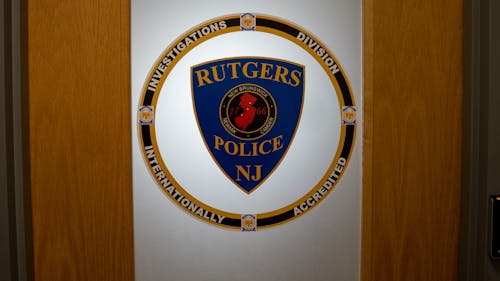Exclusive interview: RUPD Chief Kenneth Cop discusses crime alerts, blue light system, campus safety
On Wednesday, Kenneth Cop, chief of the Rutgers University Police Department (RUPD), spoke with The Daily Targum on his initiatives and goals for public safety around the University's New Brunswick campus.
Cop said he started as a security officer for the RUPD in 1995, became a police officer in 1997 and worked his way up through the ranks to become chief in 2012. As of 2023, he has worked for the RUPD for a total of 28 years.
He explained that the RUPD operates in the University's Newark and Camden campuses as well, with the chiefs of each of those campuses' RUPD divisions reporting directly to him.
Cop said the RUPD is comprised of several components, including community policing, professional standards and the investigative and the patrol divisions. Altogether, more than 170 sworn officers and even more administrative staff work for the department.
Also working under Cop's purview is the Rutgers Emergency Services, which has fire lieutenants and inspectors for fire safety and coordinates with local fire departments if there is a fire emergency on campus.
Emergency Services also has many full and part-time emergency medical technicians (EMTs) who operate the University's ambulances, which are based on Busch campus.
Regarding day-to-day RUPD patrolling, Cop said the number of police officers on duty per shift depends on the day and events around campus. He said some shifts have approximately five patrol officers, each of whom works solo and drives a police vehicle.
He said there are no specific jurisdictional boundaries for the RUPD due to its close relationship with the other law enforcement departments in the community.
"We focus our patrols in the areas where our community is, and that's what we're looking to do. I'm not so concerned about jurisdiction. Together, we want to make the community safe," he said.
Cop said he attends regular meetings between the police chiefs of Middlesex County, where he meets with the chiefs of the New Brunswick and Piscataway Police Departments. Additionally, he said public-facing officers often interact with neighboring departments.
"Our line officers and supervisors work together, not only in the field and the day-to-day but also when we have special events. We bring in New Brunswick officers, we bring in Piscataway officers to work together, and we're able to communicate," Cop said.
Regarding crime alerts, he said crimes must meet a certain threshold to warrant a University-wide email. Information about a crime is passed from patrol supervisors to the police captain to Cop, who then decides whether to send the mass email.
"Those serious crimes where there remains an ongoing threat, we would put out an alert," he said. "We would not be putting out alerts for every criminal mischief. It's a similar process for those incidents that occur in the off-campus area. That part of the city where we recognize a lot of our students live would have to be a serious crime in addition to an ongoing threat."
Cop also spoke on the initiative to install classroom-locking mechanisms across campus, stating that more than 100 classrooms have had the new locks installed. He said he hopes the remaining classroom locks will be changed within the next 24 months.
Specifically, the initiative is part of a partnership between the RUPD, the Identity and Access Management unit and University Facilities, he said. Together, these groups determine which classroom locks can be swapped and which require a completely new door to adhere to the latest locking mechanisms.
Expanding on the topic of building access and security, Cop said the University is not considering requiring swipe access to classroom buildings during the day because of the high volume of students walking in and out at all times and holding the door for others.
Though he said the Identity and Access Management unit does have time-triggered locks that can restrict access late at night and also, during an emergency, can remotely lock the exterior doors to buildings.
Discussing how the RUPD decides on-campus safety measures, Cop said the police department's policies are informed by community responses to the RUPD's annual survey as well as personal communication Cop has had with students.
For example, he said that one thing the RUPD has heard from the Rutgers community is that they do not want police patrols in and around residence halls.
Reiterating his remarks at the RUSA town hall event last month, Cop said there are security cameras on all entrances and exits to every residence hall on campus, and they can be accessed by the RUPD if needed.
Additionally, Cop said the RUPD internally tracks the number of arrests and the total number of cases it has solved — and while the department has no current plans to share this information publicly, it would consider working with the community to do so in the future.
"We're considering putting together a dashboard and what that dashboard would look like. I'd want to work with our student leadership and see what that looks like," he said.
Regarding parking lot safety, Cop said the RUPD is working with the Department of Transportation Services, which oversees parking at Rutgers, to look into technologies that can help deter and address break-ins and car thefts.
Some of the existing tools that can help track crime are the license plate readers on security vehicles that patrol the lots, he said.
He also expanded on a plan mentioned at last week's town hall meeting about the emergency phone, also often called blue light systems, around campus.
Cop said the plan to replace them over the summer would include looking at the most frequently used systems and ensuring there are not multiple systems located too close to each other. He said the system replacements would have the latest technology with new features and would be more visible.
Lastly, Cop spoke on the role of a visible police presence, whether it be a parked car or an officer stationed, in deterring crime and protecting a community.
"The RUPD — we're not about the number of citations or arrests. We're about making this a safe place to live, learn and work. So that's our goal." he said.




